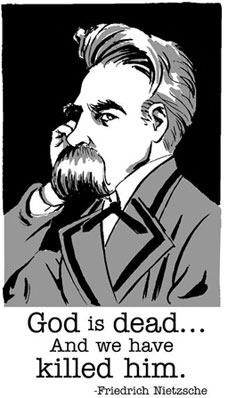Nietzsche’s Fool
From God, the Christian Socialist and the Mad Monk by Chris Uhlmann
 It might irk many to hear it but Judaeo-Christian morality is a foundation stone of Western democracy and, before we pull it out, perhaps we should ponder its strengths as well as its weaknesses. Because the West still hasn’t found an answer to the questions Friedrich Nietzsche’s fool posed in 1882.
It might irk many to hear it but Judaeo-Christian morality is a foundation stone of Western democracy and, before we pull it out, perhaps we should ponder its strengths as well as its weaknesses. Because the West still hasn’t found an answer to the questions Friedrich Nietzsche’s fool posed in 1882.
Nietzsche wrote of the lunatic “who lit a lantern in the bright morning hours, ran to the marketplace and cried incessantly, ‘I seek God! I seek God!’ As many of those who do not believe in God were standing around, just then he provoked much laughter.
“Why did he get lost?” said one. “Did he lose his way like a child?” said another. “Or is he hiding? Is he afraid of us? Has he gone away on a voyage? Or emigrated?
“Thus they yelled and laughed.
“The madman jumped into their midst and pierced them with his glances.
“Whither is God,” he cried. “I shall tell you. We have killed him – you and I. All of us are his murderers. But how have we done this? Were we able to drink up the sea? Who gave us the sponge to wipe away the entire horizon? What did we do when we unchained this Earth from its sun? Whither is it moving now? Whither are we moving now? Away from all suns? Are we not plunging continually?”
Nietzsche was an atheist. But he was honest enough to know that declaring God dead opened the horrifying prospect of having to rethink morality. He knew he had removed the keystone on which the West was built.
Our society rests on the assumption of moral absolutes: right, wrong, good and bad. That is based on the belief that there is an objective truth and from that firm foundation we can judge good and evil. Our society rests on the presumption of God.
Remove God and you hurl us into chaos: none of the comfortable assumptions remain and the entire basis of society has to be reinvented. Or you could just live a lie.
Nietzsche was courageous enough to take on what he saw as the superhuman task of trying to define morality in the absence of God. Most atheists never even imagine the question. Most have never confronted the reality of what the death of God means to the West.
We made the laws that govern our society on the Judaeo-Christian assumption of a righteous God, and we still behave as if there is one even though many no longer believe it.
We now live in a moral halfway house. When we face moral questions today we are deeply uncertain of how to proceed, because we have erased the baseline.

























